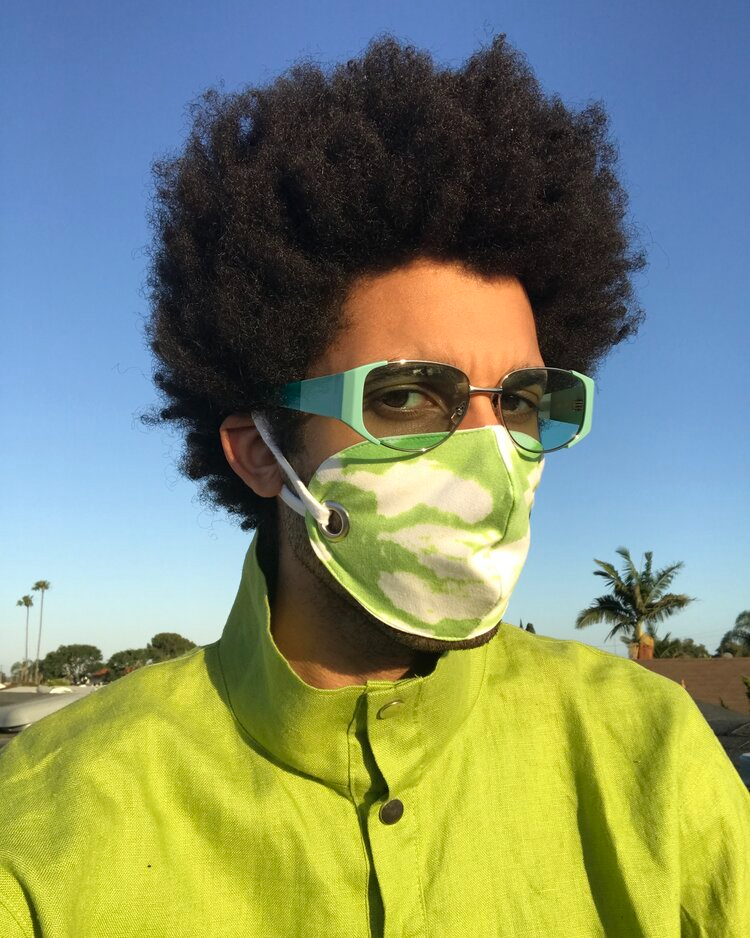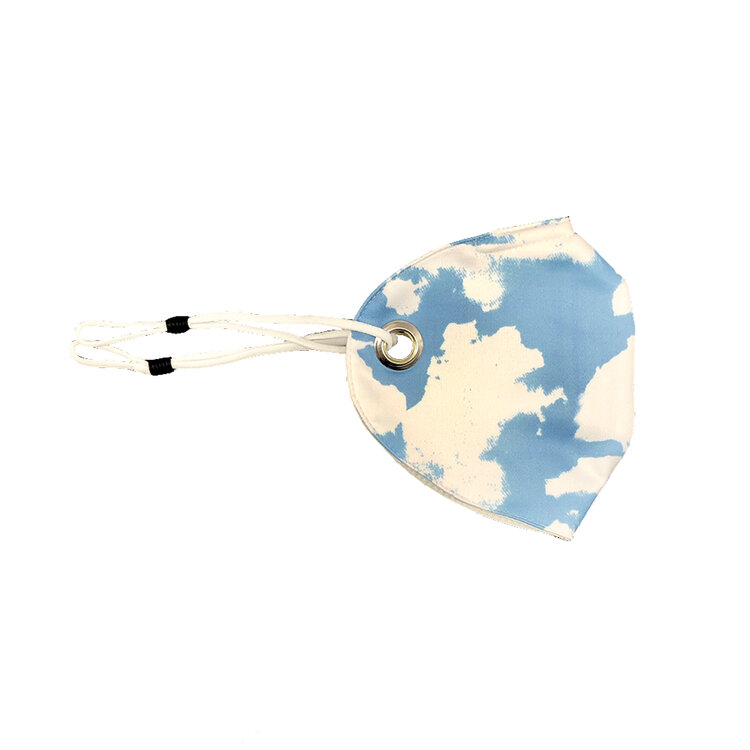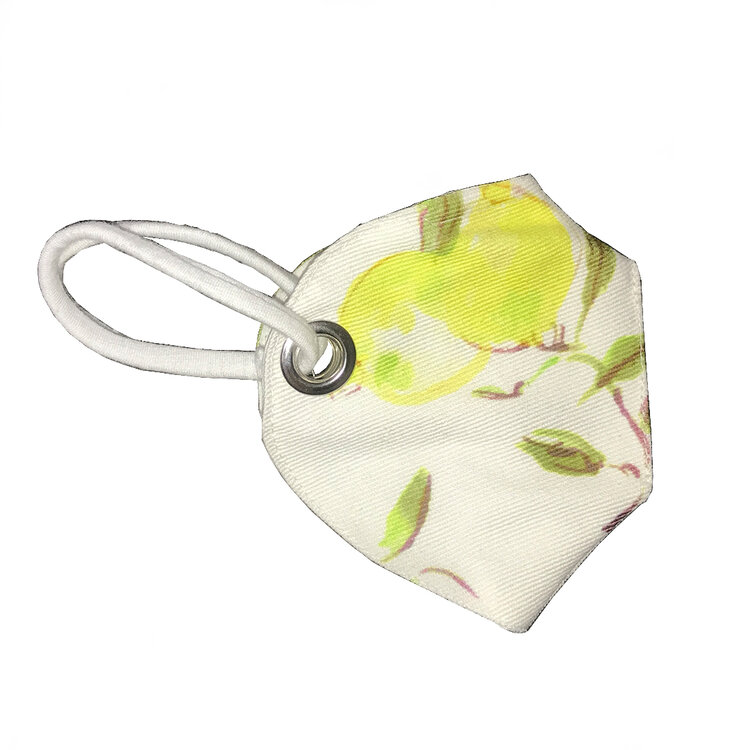From Cloud Face Masks To Gender-Fluid Clothing, Phlemuns Is Breaking The Fashion Mold
“I exist in the gray areas,” James Flemons, the designer and founder of L.A.-based unisex label Phlemuns, says about being Black, queer, and sexually-fluid in fashion — an industry where those who don’t fall under the categories of cis-gender and white are often overlooked. But it’s being a part of these marginalized communities that makes Flemons the designer that he is: one who creates clothing for everyone, no matter who they are or what gender they identify with.
Flemons founded his eponymous brand in 2013 directly after graduating with a degree in product development from the Fashion Institute of Design & Merchandising. In the years since, he’s released five collections, starting with a small denim capsule and culminating in a line of sustainable and gender-bending ready-to-wear that’s been praised by the likes Lil Nas X, Kelsey Lu, and Paloma Elsesser, among other fashion favorites.
AdvertisementADVERTISEMENT
“Any little thing I come across during the day can spark in me some random thought and birth a new concept or evolution of a design,” Flemons says of his inspiration over the years. “There are so many parts of life and different world experiences that I have not gone through myself that I can dive into and find inspiration from.” According to him, he’s also been known to dream up design ideas in his sleep, as well as utilize sketches from his time as an amateur designer. “The inspiration is constant and appears in various forms,” he says.
Photo Courtesy of Phlemuns.
According to Flemons, his goal for the brand is not about critical acclaim, but rather to make those who wear his designs — himself included — feel good. “Phlemuns evokes a raw and genuine feeling of inclusivity and personal expression,” he says. For instance, instead of following “categorical figure body types that aren’t even the same for everyone,” Flemons prefers to look at clothing from all angles, playing with different proportions and fabrics that work for all bodies. His ability to design across genders, he says, has a lot to do with his own experiences as a queer and sexually fluid person with “eclectic tastes and interests.” He says that being a Black man in the fashion industry, where he’s constantly having to “break the mold of the stereotypes that have been placed upon [him] without [his] permission,” has also influenced him as a designer.
But while Flemons is exactly what he sounds like — a beacon of positivity whose designs invoke a sense of confidence that is difficult to find in an industry based on false ideals —behind-the-scenes, the fashion industry has taken its toll oh him. When asked about fashion’s recent interest in the Black Lives Matter movement, Flemons calls it “a very double-edged sword.” “I love it and hate it,” he adds. On one hand, the designer is grateful for the changes that are being made and the fact that Black designers are at last being recognized “as they should have been this entire time.” On the other, as he points out to me, it shouldn’t take a revolution for these designers to be noticed. “As someone who has talked about these injustices for years, I’m a bit tired of the conversation,” he says. “I just want to evolve and thrive — I’ve gotten to where I am without any of these fashion peoples’ help, and I will continue to do so.”
AdvertisementADVERTISEMENT
From the very beginning, Flemons says that his career has been “a constant battle,” one during which he’s had to work tirelessly just to be free to create his own narrative. “I’ve had to fight against using the race card,” he says. “But a majority of the time, that was the only answer I could come up with for a lot of my mistreatment.” Sitting by and watching as other non-Black designers who are less qualified and less talented than he is being given advantages that he’s never been privy to — from retail to production to design — has been one of the biggest challenges throughout the course of his career in fashion.
And it doesn’t end with a lack of recognition or opportunities for Black designers. “I found in many cases that I was the token Black person,” he says. He also says that his brand is constantly being referred to as “urban” and that he’s been subject to ridicule regarding the use of Black models over white models for his campaigns. “So much of my world and experience is a diverse mix of Black people,” he says. The Black community also makes up “the largest percentage of people who purchase my clothing,” he continues, “which I have found to be very ironic since we are the least catered to, but [the ones who] spend the most.”
For Flemons, all of these forms of mistreatment can be tied back to one thing: “Fashion has never been a space for Black people,” he says. “Our history in this industry has been about breaking down barriers and creating our own worlds because we weren’t accepted in the other.”
AdvertisementADVERTISEMENT
Despite working in an industry that wasn’t built with him in mind, Flemons continues to be a leader in it. In February, when most brands were too consumed with Fashion Month to switch focus onto the pandemic looming overhead, Flemons and his team were busy at work designing face masks. “Yet again, I saw a void and worked to fill it,” he says. The Phlemuns masks, which are designed to match the label’s latest collection and printed with neon green and aqua blue clouds, lemons, butterflies, and leopard spots. A month later, every brand had to shift to selling face masks.
When asked what was next for Phlemuns, the designer brushes off the question, instead saying this: “I have acknowledged and accepted that I am not just a designer. I am a clothing brand, a creative entity, an experience, a voice for the unheard, a conversation, a world all of my own that has pushed outside of the limits of this box I was placed in and have now entered the endless limits of infinity.” And just like that, our hope for fashion is restored.
At Refinery29, we’re here to help you navigate this overwhelming world of stuff. All of our market picks are independently selected and curated by the editorial team. If you buy something we link to on our site, Refinery29 may earn commission.
AdvertisementADVERTISEMENT









